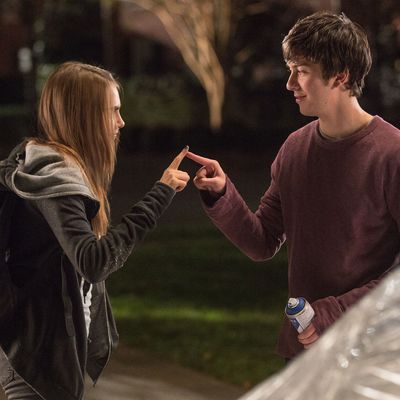
The new John Green adaptation Paper Towns is a beautiful bait-and-switch. It starts off with our shy teenage hero Quentin (Nat Wolff) narrating how he came to meet his free-spirited next-door neighbor Margo Roth Spiegelman (Cara Delevingne), and how they grew up as best friends in suburban Orlando until the perils of teenage social classism pulled them apart; she became a cool, popular beauty who partied with jocks, while he became a nerd with poor social skills and no confidence. Even so, Quentin refers to Margo as his “miracle.” She’s fearless, tough, and mysterious. At least, that’s the fantasy into which he pulls himself — and us.
Paper Towns, which was directed by Jake Schreier (who made a very good indie movie called Robot & Frank several years ago) and written by Michael Weber and Scott Neustadter (who also wrote the film adaptation of Green’s The Fault in Our Stars, as well as The Spectacular Now and 500 Days of Summer), purports to be a romance, and then a mystery, but it turns out to be something else altogether. Not long before they’re supposed to graduate from high school, Margo materializes in Quentin’s bedroom and whisks him off on a night of creative retribution, which involves breaking into her friends’ houses and cars and giving them nasty little reminders of a horrible betrayal. (Basically, her boyfriend’s been cheating on her with one of her close friends, and she’s pissed.) Director Schreier shoots these two kids’ ultimately dorky revenge spree with an almost mythic sense of freedom — contrasting the flat, ominous blandness of these subdivisions with a vast twilit sky, alive with possibility. By the time Margo and Quentin end their night in a drab, empty corporate conference room with a great view, looking out over the city as they dance to a Muzak version of “Lady in Red,” we’re kind of in love with Margo ourselves, and with everything she represents. “The way you felt tonight is the way you should feel your whole life” are her parting words to him.
Then, just as quickly as she’d reentered Quentin’s life, Margo disappears. In a few brief weeks, myths grow around her. She’s reenacted, it seems, a typically American ritual: She’s lighted out for the territory, away from the drain of the everyday. Quentin, taken by Margo’s childhood games and her fondness for dropping clues wherever she goes, decides to track her down. Joining him are his two closest friends, Ben (Austin Abrams) and Radar (Justice Smith, a revelation), as well as Radar’s girlfriend, Angela (Jaz Sinclair), and Margo’s best friend, Lacey (Halston Sage), who had been the butt of one of Margo’s revenge pranks and now wants to redeem herself. As Quentin and the others start to follow Margo’s clues, they start to bond in deeper ways … and I’ll stop right there with the plot description. I haven’t read Green’s novel, but I suspect that the film is pretty faithful to the original.
As played by Delevingne, Margo is indeed an apparition; the actress’s oddly elfin features give her an otherworldly quality, like a fairy stranded in suburbia, approachable yet exotic. But she’s not quite a manic pixie dream girl. She confesses to having done some lousy, petty things. More important, her euphoria can suddenly give way to impenetrable melancholy, and she has a poetic understanding of others’ despair. In an early scene, she and Quentin discover the body of a man who shot himself; thinking about him later, Margo remarks, “All the strings inside him broke.” Quentin, at first, doesn’t notice Margo’s deep undercurrent of sadness, but we do. The film has already started to chip away at the fantasy, long before he starts to do so. As Margo herself puts it: “Everything’s uglier up close.”
But like I said, the film changes. At first it feels like a letdown. Delevingne is so good, so magnetic, that there’s a palpable drop in pressure after she vanishes, and Wolff, while not a bad actor, doesn’t quite have the charisma to hold our attention. (He’s like a poor man’s Miles Teller.) But the film clearly understands that because the slack is taken up by Quentin’s friends, in particular Radar and Angela, who seem to be having the rare healthy high-school romance. These kids are not Margo. They’re … kids, filled with fear and anxiety, articulate in their very inarticulateness; they stumble over their words even as they try to express deep feelings. (That these other actors seem to be genuinely younger than Delevingne and Wolff merely adds to the disconnect in an interesting way; the age difference feels thematically pointed.) They’re real and grounded and life-size in a way Margo never was — or, more accurate, in a way that Quentin never let Margo be.
There’s a common language to these types of romantic teen flicks, and Paper Towns hits all the requisite notes: The soft indie-pop comes in at just the right moments, and the light comedy plays well without stepping on the sensitive feelings being expressed. That might make it easy to mistake the film for humdrum genre work, but there’s something bold here, too: Paper Towns needs to explode its own mystique in order to make a point. It has to acknowledge that underneath all the melodrama these are just confused kids. The film could easily continue down its dreamy path but it has the cool idea of putting us under a spell and gradually, imperceptibly pulling us back to the world of the real. The result isn’t an all-the-feels, drown-us-in-tears kind of experience, but something rooted in wisdom and clarity. It’s the rare movie that can sacrifice the clean lines of fantasy and melodrama for the messiness of ordinary life — that neither burnishes nor condemns the up-down turmoil of the teenage soul, but rather lets it be.


